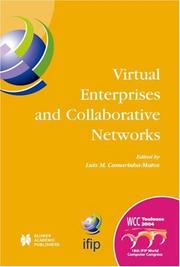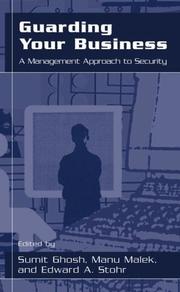| Listing 1 - 4 of 4 |
Sort by
|

ISBN: 1280148233 978140207932X 9786610148233 140207932X 1402077548 Year: 2004 Publisher: Boston, Massachusetts : Kluwer Academic Publishers,
Abstract | Keywords | Export | Availability | Bookmark
 Loading...
Loading...Choose an application
- Reference Manager
- EndNote
- RefWorks (Direct export to RefWorks)
Our understanding of management in Asia has not kept pace with the demands of managers and students. The Handbook of Asian Management provides in-depth critical reviews of central topics in strategy and organizational behavior research in Asian contexts. Leading scholars take stock of what has been learned and give clear directions towards greater rigor and relevance for research in this region.
Leadership. --- Management. --- Business Strategy/Leadership. --- Strategic planning --- Personnel management --- Organizational behavior --- Management --- Administration --- Industrial relations --- Organization --- Ability --- Command of troops --- Followership --- Behavior in organizations --- Psychology, Industrial --- Social psychology --- Corporations --- Employment management --- Human resource management --- Human resources management --- Manpower utilization --- Personnel administration --- Public administration --- Employees --- Employment practices liability insurance --- Supervision of employees --- Goal setting (Strategic planning) --- Planning, Strategic --- Strategic intent (Strategic planning) --- Strategic management --- Planning --- Business planning

ISBN: 9781402081385 1402081383 9781402081392 1402081391 1280608617 9786610608614 Year: 2004 Publisher: Boston, Massachusetts : Kluwer Academic Publishers,
Abstract | Keywords | Export | Availability | Bookmark
 Loading...
Loading...Choose an application
- Reference Manager
- EndNote
- RefWorks (Direct export to RefWorks)
Collaborative Network Organizations (CNO) corresponds to a very active and steadily growing area. For instance, Virtual enterprises/Virtual Organizations (PVC) suggest new ways of work and put the emphasis on collaborative networks of human actors. Further to these main lines, other collaborative forms and patterns of collaborative behavior are emerging, not only in industry, but also in service sector, as well as governmental and non-government social organizations, e.g. the collaborative networks for rescue tasks in disaster situations, time bank organizations, etc. The concept of breeding environment is now understood as a fundamental entity to enable dynamic collaborative organizations.
Business enterprises --- Virtual corporations --- Knowledge management --- Intranets (Computer networks) --- Extranets (Computer networks) --- Entreprises --- Entreprises virtuelles --- Gestion des connaissances --- Intranets --- Extranets --- Computer networks --- Congresses. --- Réseaux d'ordinateurs --- Congrès --- Business enterprises -- Computer networks -- Congresses. --- Electronic books. -- local. --- Extranets (Computer networks) -- Congresses. --- Intranets (Computer networks) -- Congresses. --- Knowledge management -- Congresses. --- Virtual corporations -- Congresses. --- Management Theory --- Management --- Business & Economics --- Business. --- Leadership. --- Computer organization. --- Computers. --- Business and Management. --- Business Strategy/Leadership. --- Computer Systems Organization and Communication Networks. --- Information Systems and Communication Service. --- Computer network architectures. --- Information systems. --- Automatic computers --- Automatic data processors --- Computer hardware --- Computing machines (Computers) --- Electronic brains --- Electronic calculating-machines --- Electronic computers --- Hardware, Computer --- Computer systems --- Cybernetics --- Machine theory --- Calculators --- Cyberspace --- Organization, Computer --- Electronic digital computers --- Ability --- Command of troops --- Followership --- Virtual private networks (Computer networks) --- VPNs (Computer networks) --- Wide area networks (Computer networks) --- Internal internets (Computer networks) --- Corporations

ISBN: 140201726X 9786610147946 1280147946 1402026730 Year: 2004 Publisher: Dordrecht ; Boston : Kluwer Academic,
Abstract | Keywords | Export | Availability | Bookmark
 Loading...
Loading...Choose an application
- Reference Manager
- EndNote
- RefWorks (Direct export to RefWorks)
This book comprises a set of papers selected from those presented at the fifth « International Conference on Enterprise Information Systems », (ICEIS’2003) held in Angers, France, from 23 to 26 April 2003. The conference was organised by École Supérieure d’Électronique de l’Ouest (ESEO) of Angers, France and the Escola Superior de Tecnologia of Setúbal, Portugal. Since its first edition in 1999, ICEIS focuses on real world applications and aims at bringing together researchers, engineers and practitioners interested in the advances and business applications of information systems. As in previous years, ICEIS’2003 held four simultaneous tracks covering different aspects of enterprise computing: Databases and Information Systems Integration, Artificial Intelligence and Decision Support Systems, Information Systems Analysis and Specification and Software Agents and Internet Computing. Although ICEIS’2003 received 546 paper submissions from over 50 countries, only 80 were accepted as full papers and presented in 30-minutes oral presentations. With an acceptance rate of 15%, these numbers demonstrate the intention of preserving a high quality forum for future editions of this conference. From the articles accepted as long papers for the conference, only 32 were selected for inclusion in this book Additional keynote lectures, tutorials and industrial sessions were also held during ICEIS’2003, and, for the first time this year, the 1st Doctoral Consortium on Enterprise Information Systems gave PhD students an opportunity to present their work to an international audience of experts in the field of information systems.
Management information systems --- Information storage and retrieval systems --- Computer science. --- Leadership. --- Software engineering. --- Data structures (Computer science). --- User interfaces (Computer systems). --- Artificial intelligence. --- Computer Science. --- Artificial Intelligence (incl. Robotics). --- Business Strategy/Leadership. --- Software Engineering/Programming and Operating Systems. --- Data Structures, Cryptology and Information Theory. --- User Interfaces and Human Computer Interaction. --- Information Systems Applications (incl. Internet). --- Data structures (Computer scienc. --- Artificial Intelligence. --- Data Structures and Information Theory. --- Data structures (Computer science) --- Information structures (Computer science) --- Structures, Data (Computer science) --- Structures, Information (Computer science) --- Electronic data processing --- File organization (Computer science) --- Abstract data types (Computer science) --- Computer software engineering --- Engineering --- Informatics --- Science --- Ability --- Command of troops --- Followership --- AI (Artificial intelligence) --- Artificial thinking --- Electronic brains --- Intellectronics --- Intelligence, Artificial --- Intelligent machines --- Machine intelligence --- Thinking, Artificial --- Bionics --- Cognitive science --- Digital computer simulation --- Logic machines --- Machine theory --- Self-organizing systems --- Simulation methods --- Fifth generation computers --- Neural computers --- Application software. --- Application computer programs --- Application computer software --- Applications software --- Apps (Computer software) --- Computer software --- Interfaces, User (Computer systems) --- Human-machine systems --- Human-computer interaction

ISBN: 0306486385 0306484943 Year: 2004 Publisher: New York, New York : Kluwer Academic/Plenum,
Abstract | Keywords | Export | Availability | Bookmark
 Loading...
Loading...Choose an application
- Reference Manager
- EndNote
- RefWorks (Direct export to RefWorks)
Guarding Your Business outlines the organizational elements that must be in place to protect the information and physical assets of typical businesses and organizations. The book recognizes the need for an architecture integrated within the organizational environment for systematic protection. Such an architecture is offered along with the building blocks to make organizations resistant to human error and resilient under physical attack or natural disaster. The book addresses risk assessment, determination of quality-of-service levels that balance safety versus cost, security versus privacy, determination of access rights to data and software, and a security-conscious culture in the organization. Questions answered by experts from academia and industry include: How can one organize for security? What organizational structures, policies, and procedures must be in place? What legal and privacy issues must be addressed?
Business enterprises --- Electronic commerce --- Computer networks --- Computer security --- Data protection --- Security measures --- Leadership. --- Information Systems. --- Computer engineering. --- Social sciences. --- Systems theory. --- Anthropology. --- Business Strategy/Leadership. --- Management of Computing and Information Systems. --- Electrical Engineering. --- Social Sciences, general. --- Systems Theory, Control. --- Management information systems. --- Computer science. --- Electrical engineering. --- System theory. --- Human beings --- Systems, Theory of --- Systems science --- Science --- Behavioral sciences --- Human sciences --- Sciences, Social --- Social science --- Social studies --- Civilization --- Electric engineering --- Engineering --- Informatics --- Computer-based information systems --- EIS (Information systems) --- Executive information systems --- MIS (Information systems) --- Sociotechnical systems --- Information resources management --- Management --- Ability --- Command of troops --- Followership --- Philosophy --- Communication systems --- Business organizations --- Businesses --- Companies --- Enterprises --- Firms --- Organizations, Business --- Business --- Communication systems, Computer --- Computer communication systems --- Data networks, Computer --- ECNs (Electronic communication networks) --- Electronic communication networks --- Networks, Computer --- Teleprocessing networks --- Data transmission systems --- Digital communications --- Electronic systems --- Information networks --- Telecommunication --- Cyberinfrastructure --- Electronic data processing --- Network computers --- Cybercommerce --- E-business --- E-commerce --- E-tailing --- eBusiness --- eCommerce --- Electronic business --- Internet commerce --- Internet retailing --- Online commerce --- Web retailing --- Commerce --- Information superhighway --- Data governance --- Data regulation --- Personal data protection --- Protection, Data --- Computer privacy --- Computer system security --- Computer systems --- Computers --- Cyber security --- Cybersecurity --- Electronic digital computers --- Protection of computer systems --- Security of computer systems --- Security systems --- Hacking --- Distributed processing --- Protection
| Listing 1 - 4 of 4 |
Sort by
|

 Search
Search Feedback
Feedback About UniCat
About UniCat  Help
Help News
News